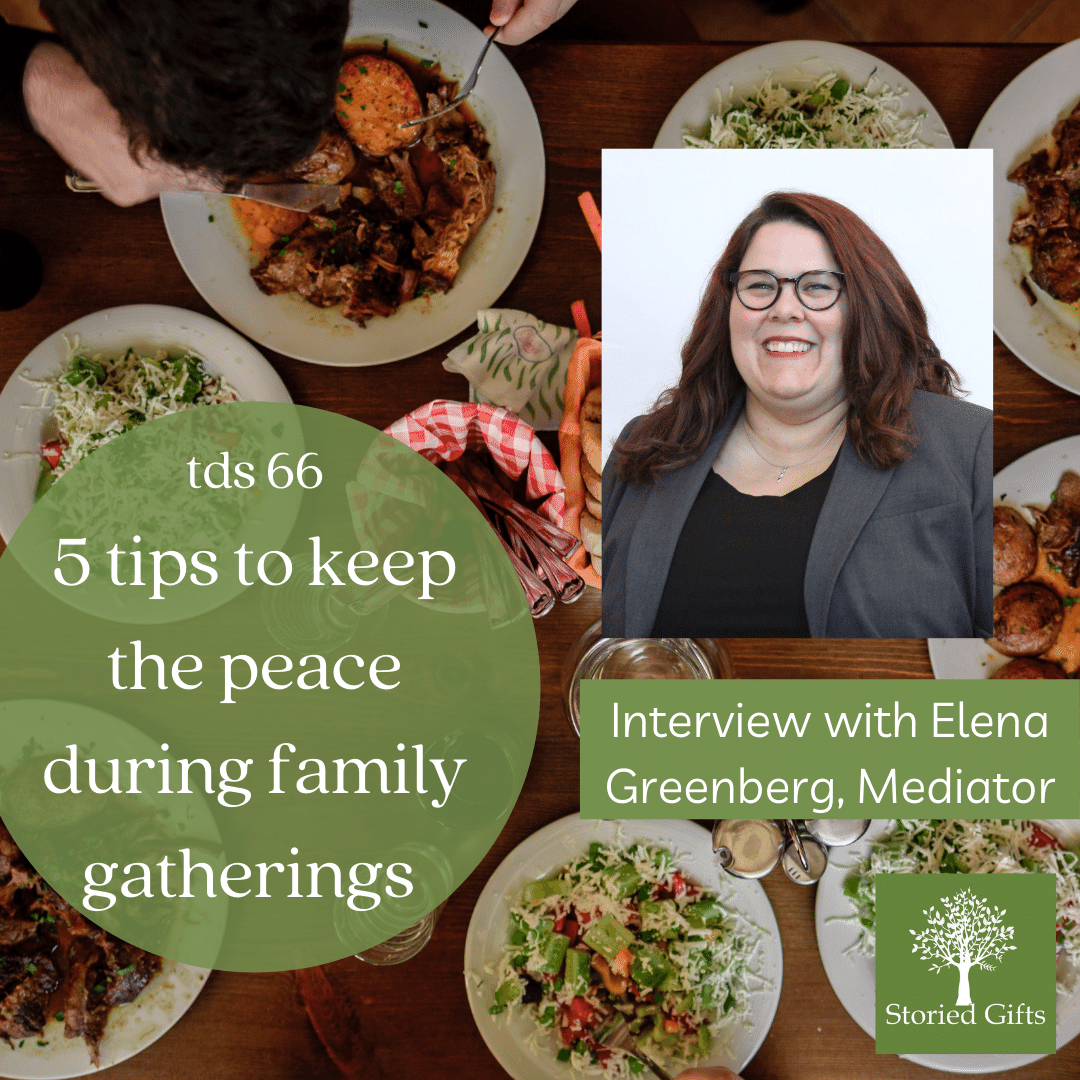5 Tips to Keep the Peace During Family Gatherings, Interview with Elena Greenberg
Keep the Peace when it matters over dinner!
Disclosure: There are some affiliate links below, and I may receive commissions for purchase made through the links in the post. However, these are products I highly recommend. I won’t list anything I haven’t tried and found personally useful.
Have you ever looked out on the world (listened to too much news) and wondered, "why can't people just get along?"
We all want roughly the same things: a happy life, experience love and family, prosper and live. But we all seem ready to roll over others to achieve these goals, desperate in our feelings of lacking.
Indeed, global peace and recognizing each other's shared needs and desires seem unimaginable. It is easy to feel hopeless and powerless in that reckoning because even many of our close relationships are at odds. Our country seems more at war within in recent years, and the fighting spills over into families. We've lost sight of each other while entrenching ourselves in our camps.
Do you feel that tug of toxicity – from entrenched opinions about thorny subjects like religion and politics – with some people in your life? I do. But wait, we must have some influence, if not on the world stage, at least in our backyards with family and community.
Our families are a microcosm of humanity, a path to understanding our bonds to the larger world. Through family and friendships, we gain insights into how to be humane. So, when intimate ties crash, we can feel lost not just in who we are but also in what purpose our lives even serve.
If you've struggled to find peace within and without, this episode of The Delicious Story is for you. Here I chat with Elena Greenberg, a practicing attorney, mediator, and professional mentor.
Elena walks us through steps and ideas to help us find common ground and harmony with family, not just for the holidays, but the long haul, too.
“The best things and the best people rise out of their separateness, I’m against a homogenized society because I want the cream to rise.” Robert Frost
Our Separateness
We are each unique in our views of the world. You've probably realized this when you've shared an experience, witnessed an event, or even read the same book with others and noted that you don't "see" the facts or their meaning the same way.
We each interpret the outside "reality" based on our prism of life knowledge and prejudices. And the truth of the variations of perspective is that sometimes objective facts become irrelevant. Often, two people can't agree on what is, infact fact. We become stranded in subjective opinion instead.
And what's more, the person you are now and the opinions you hold dear may not be relevant later as you grow and change. Thus, you can't be certain that the opinions you believe today, will be yours by tomorrow.
So, in theory and based on experience, we get that we're different. And we either come to terms with the differences, find them exciting or unimportant or deny they exist at all. We often seek those we believe are the "same," because differences can cause us internal stress.
When it comes to strongly held opinions, like those of politics and religion, we become entrenched in the "facts" (code for opinions) that we believe even at the expense of important relationships. And the more we insist on our rightness, the less we hear or seek to understand any other point of view. Growth is not possible.
Finding Our Common Ground
I've been thinking a lot about estrangement in families lately since I've read Karl Pillemer's book Fault Lines: Fractured Families and How to Mend Them. Throughout the book, he interviews numerous people experiencing estrangement from family members.
Pillemer suggests that these fractured bonds don't serve us and leave holes in our family ties that impact generations into the future. He also tells stories of those who decide they want to end the estrangement.
Reconciliation hinges on a few points. To mend, all involved realize that the past disagreement is no longer critical. They also recognize they don't require an apology for an old wrong. And ultimately, the path to a relationship lies in going forward.
If you've been teetering on the brink of fissures in your family because of toxic topics, try to turn a corner for the holidays and beyond. Elena offers some tips for guidance.
Recognize nobody's opinions are going to change. Straight up acknowledge that you don't wish to change your opinions, and neither does the other party. Lower your bar of expectation. Search for topics where you're less invested and more aligned and discuss those.
Stick to doing things together you enjoy. My husband's family used to put on elaborate dinners where we'd eat and then finish up discussing topics for hours into the evening over fine bottles of wine.
On the other hand, my parent's family gathered a couple of times a year and largely didn't say anything I considered to be of substance. Instead, we played Trivial Pursuit and other games. For years, I didn't get why this was their choice. But now I see the wisdom. When you don't have a lot of topics of interest in common, playing games is one way to enjoy time together and have fun.
3. Set boundaries for the time of the holidays. Allow room for discussions later. Elena explains that setting boundaries for a family event doesn't mean we can only talk about the turkey and the pie. It does mean determining when other more challenging subjects are best to discuss.
You can set aside time to talk about issues you want to talk about, but agree that doing so during dinner, for example, will not help you all enjoy the time together.
4. Determine for yourself what it is you want to accomplish by gathering as a family. It's a good idea to establish your goals for the family event and then check in often if you feel yourself slipping into a mood or veering toward a topic that will derail that objective.
The challenge is to gracefully ask Uncle John, for example, in a patient way if we can table a conversation for a time other than dinner. How would you ask Uncle John to shift to another subject?
5. Be curious. When you do open up to discuss difficult topics, spend more time listening and repeating back what you hear. "Tell me more" is a lot more inviting than "no, you're wrong!" We all want to be understood. A barrage of facts or arguments where neither party is actually listening is not going to make understanding possible.
You’re On a Quest!
Be objective, listen actively. (Yes, this is a massive shift and a challenge) Put on your scientist's hat, and look at the situation as if you're tasked with studying it.
You can benefit from learning what is driving someone's opinions beyond the facts. Why do they feel as they do? Try to understand the feelings of the other person: they are more important than the facts themselves.
There is no doubt that many of us feel stressed about the cultural dialogue we hear and talk about these days. But bickering about facts and disassociating with family and friends is not going to solve problems or help you even feel better.
Personal bitterness is a road to personal suffering. Strive to understand yourself and others. Make connection on common ground such as shared feelings the goal. Practice the tips here, and not only will you enjoy your family and friends more, but you'll also feel more hopeful about personal circumstances and the world outside of your control.
To learn more about Elena Greenberg and the services of mediation she provides via Iowa Mediation Services you can check out her link.
Postscript: When things seem out of control like it feels these days, acting where we have control is a comfort. Cleaning up your stuff is within your power! If you need help getting going on organizing your home check out Get Organized Gal’s courses for support.
I used her course to organize my office, and it is in pretty good shape these days. Success in one space has lead to cleaning channels to other rooms and photos as well. Check out he courses here.
Sherry and Alexandra Borzo together in Lima, Peru
Sherry is the founder of Storied Gifts a personal publishing service of family and company histories. She and her team help clients curate and craft their stories into books. When not writing or interviewing, Sherry spends loads of time with her grandchildren and lives in Des Moines, Iowa.
STORIED GIFTS SHOP
Need a beautiful infusion of inspiration for your storied life? Please check out the Storied Gifts Shop where the theme is Words of Encouragement.
The shop is a mother and daughter venture for Sherry and Alexandra Borzo of Content In Motion. They both work to help their client's stories sing. The shop is their effort to inspire a focus on healthy minds for everyone through positive thought.
LET’S BE FRIENDS
Please like the Storied Gifts Facebook page. We offer tips and inspirations to help you tell your stories and live a storied life by harnessing your healthy mind through the power of the thoughts you choose.













